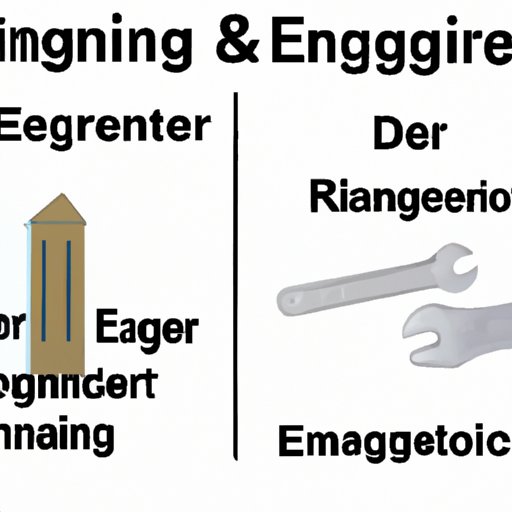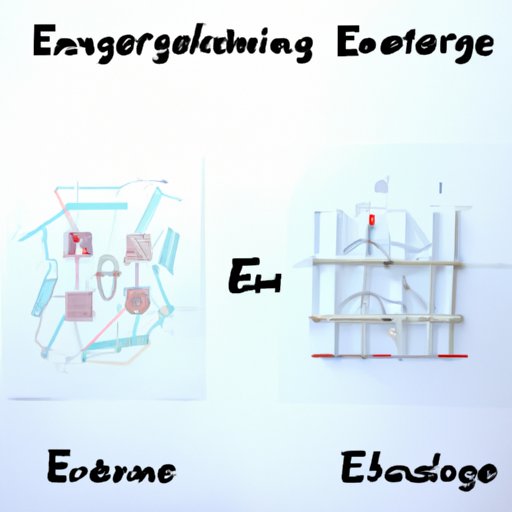Introduction
Engineering and engineering technology are two closely related fields that often get confused for one another. While there are some similarities, it’s important to understand the core differences between the two disciplines in order to make an informed decision about which path is best for you. In this article, we’ll explore the key distinctions between engineering and engineering technology, from their areas of focus to the various career paths available to those who pursue either field.

A Comparison of Engineering and Engineering Technology: Exploring the Differences
The first step towards distinguishing between engineering and engineering technology is to understand the core differences between the two. At their most basic level, engineering and engineering technology are both disciplines focused on applying scientific and mathematical principles to solve problems. However, there are some key distinctions that set these two fields apart.
Understanding the Core Differences Between Engineering and Engineering Technology
According to the National Academy of Engineering, “engineering is the creative application of science, mathematical methods, and empirical evidence to the innovation, design, construction, operation and maintenance of structures, machines, materials, software, systems, processes, and organizations.” In contrast, engineering technology is defined as “the practical application of engineering principles and techniques to the development, implementation, operation, and maintenance of systems, devices, and processes.”
Examining the Different Areas of Focus in Engineering and Engineering Technology
When it comes to the areas of focus for each discipline, engineering tends to be more theoretical in nature, while engineering technology is more hands-on and applied. Engineers are typically responsible for designing new systems or products from the ground up, while engineering technologists are focused on improving existing systems or products. As a result, engineers tend to have a stronger understanding of the underlying principles of their field, while engineering technologists are better equipped to apply those principles in the real world.
Analyzing the Various Career Paths Available to Those Who Pursue Engineering or Engineering Technology
The career paths available to those who pursue engineering or engineering technology can vary significantly. Engineers tend to work in research and development, product design, or management roles, while engineering technologists may find employment in manufacturing, testing, or installation. Additionally, engineers often specialize in a particular area, such as electrical engineering or civil engineering, while engineering technologists may work in a variety of industries, including healthcare, aerospace, and automotive. Finally, engineers typically require a higher level of education than engineering technologists, and are more likely to pursue advanced degrees.
The Difference Between Engineering and Engineering Technology: A Primer
Now that we’ve explored the core differences between engineering and engineering technology, let’s take a closer look at the education requirements and skills needed to succeed in each field.
Overview of the Education Requirements for Both Engineering and Engineering Technology
In order to become a professional engineer, individuals must typically obtain a four-year bachelor’s degree in engineering from an accredited program. They must also pass a licensing exam administered by their state or provincial board. Engineering technologists, on the other hand, usually only need an associate’s degree from a technical college or university or a two-year diploma from a community college.
Exploring the Skills Needed to Succeed in Each Field
No matter which field you choose to pursue, it’s important to have a strong foundation of knowledge and skills in order to be successful. For engineers, this includes problem-solving, critical thinking, and analytical skills, as well as a deep understanding of mathematics and science. Engineering technologists should possess similar skills, but they should also be proficient in using computers, troubleshooting, and working with their hands. Additionally, both engineers and engineering technologists should be adept at communicating their ideas clearly and effectively.
Comparing the Job Outlooks for Engineers and Engineering Technologists
The job outlook for engineers and engineering technologists is strong, with both fields expected to experience above-average growth over the next decade. According to the U.S. Bureau of Labor Statistics, the median salary for engineers was $91,010 in 2019, while engineering technologists earned a median salary of $63,890. Additionally, engineers tend to have more opportunities for advancement and higher salaries than engineering technologists, although both professions offer a range of interesting and rewarding career paths.

Engineering vs Engineering Technology: What You Need to Know
Now that we’ve looked at the education requirements, skills, and job outlooks for both engineering and engineering technology, let’s explore the benefits of pursuing either field.
Investigating the Benefits of Pursuing a Degree in Engineering or Engineering Technology
Pursuing a degree in either engineering or engineering technology can provide numerous benefits. For starters, both fields offer excellent job security and the potential for high earnings. Additionally, engineers and engineering technologists can find employment in a wide range of industries, from healthcare to aerospace. And finally, both disciplines involve the application of scientific principles and can provide an opportunity to make a positive impact on the world.
Discussing the Advantages of Choosing One Over the Other
When deciding between engineering and engineering technology, it’s important to consider your own goals and interests. If you’re looking for a more theoretical and research-focused career, then engineering might be the right choice for you. On the other hand, if you’re more interested in a hands-on and applied approach, then engineering technology might be a better fit. Additionally, if you’re looking for a shorter path to a career in engineering, then engineering technology may be the way to go.
Assessing the Pros and Cons of Each Discipline
It’s also important to consider the pros and cons of each field when making your decision. While both engineering and engineering technology can lead to rewarding careers, engineers tend to have more opportunities for advancement and higher salaries. Additionally, engineers are typically required to obtain a four-year degree, while engineering technologists often only need an associate’s degree. However, engineering technologists may have more job security and flexibility than engineers, as they are not required to obtain a license.
Engineering or Engineering Technology? Unveiling the Distinctions
Now that we’ve discussed the benefits of pursuing either engineering or engineering technology, let’s take a closer look at the specific responsibilities of engineers and engineering technologists.
Outlining the Specific Responsibilities of Engineers and Engineering Technologists
Engineers are typically responsible for designing and developing new products, systems, or processes. This involves researching, analyzing, and testing new technologies in order to create innovative solutions. Engineering technologists, on the other hand, are typically tasked with implementing and maintaining existing systems. This involves troubleshooting and resolving issues, as well as ensuring that systems and products meet quality standards. Additionally, engineering technologists may also be involved in the design process, but their primary focus is on the implementation and maintenance of existing systems.
Examining the Different Approaches Used in Each Field
The approaches used by engineers and engineering technologists can also vary significantly. According to Dr. Chris Wirth, Professor of Mechanical Engineering at the University of Maryland, “Engineers use a top-down approach where they start with the big picture and break it down into smaller components. Engineering technologists, on the other hand, use a bottom-up approach where they start with the details and build up to the bigger picture.” This difference in approach can lead to different outcomes, so it’s important to understand the implications of each approach before making a decision.
Uncovering the Similarities and Differences Between Both Disciplines
While there are some key differences between engineering and engineering technology, there are also a number of similarities. For instance, both disciplines involve the application of scientific principles and the use of mathematics and technology to solve problems. Additionally, both fields require strong communication and problem-solving skills. Finally, both engineers and engineering technologists can find employment in a variety of industries, from healthcare to aerospace.

Understanding the Discrepancies Between Engineering and Engineering Technology
In order to make an informed decision about which field is right for you, it’s important to understand the discrepancies between engineering and engineering technology. Let’s take a closer look at how the fields differ in terms of salaries, job roles, and opportunities.
Comparing the Salaries, Job Roles, and Opportunities Available in Both Fields
As mentioned previously, engineers tend to have higher salaries than engineering technologists, as well as more opportunities for advancement. Additionally, engineers often specialize in a particular area, while engineering technologists may work in a variety of industries. Finally, engineers are typically responsible for designing new systems or products, while engineering technologists are focused on improving existing systems or products.
Exploring the Impact That Specialization Can Have on Potential Careers
Specializing in a particular area of engineering or engineering technology can also have a significant impact on potential careers. For instance, those who specialize in electrical engineering may find employment in the automotive industry, while mechanical engineering specialists may be hired to design aircraft. Additionally, engineering technologists may specialize in areas such as computer programming or robotics, which can open up a range of exciting job opportunities.
Looking at How the Fields of Engineering and Engineering Technology Evolve Over Time
Finally, it’s important to consider how the fields of engineering and engineering technology evolve over time. As new technologies are developed, the demand for engineers and engineering technologists with specialized skills increases. Additionally, the roles and responsibilities of engineers and engineering technologists may also change over time, as new technologies and processes are introduced.
Conclusion
Engineering and engineering technology are two closely related fields that often get confused for one another. While there are some similarities, it’s important to understand the core differences between the two disciplines in order to make an informed decision about which path is best for you. From their areas of focus to the various career paths available, this article has explored the key distinctions between engineering and engineering technology, providing a primer on the education requirements, skills needed to succeed, job outlooks, and more.
In summary, engineering is a more theoretical and research-based discipline, while engineering technology is more hands-on and applied. Engineers typically require a higher level of education than engineering technologists, and have more opportunities for advancement and higher salaries. Ultimately, the best option for you will depend on your own goals and interests, so it’s important to do your research and weigh the pros and cons of each field before making a decision.
(Note: Is this article not meeting your expectations? Do you have knowledge or insights to share? Unlock new opportunities and expand your reach by joining our authors team. Click Registration to join us and share your expertise with our readers.)
